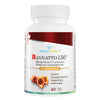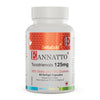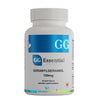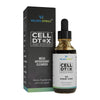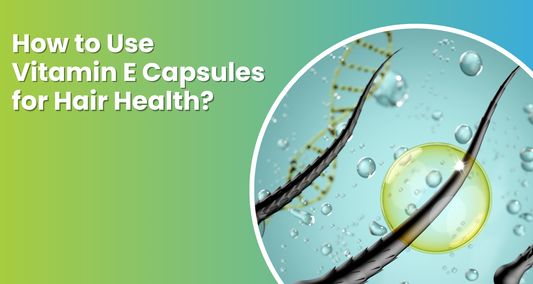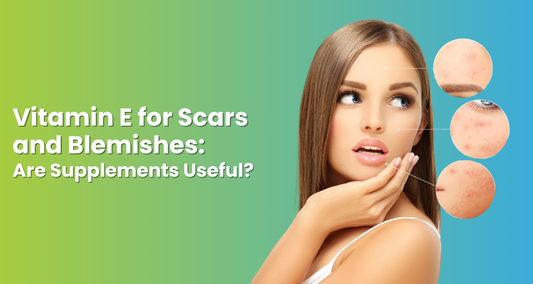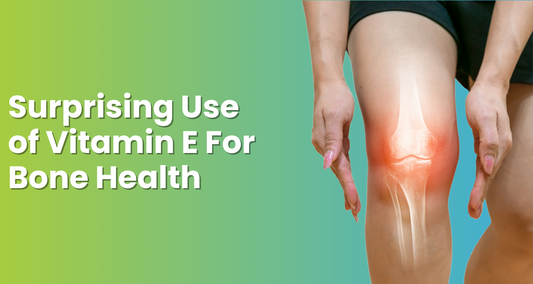Vitamin E is a powerhouse nutrient with surprising health benefits. From protecting your skin to strengthening your immune system, it plays a vital role in keeping your body functioning at its best.
With this blog, learn about different forms of Vitamin E, recommended dose of Vitamin E, and how to get enough of this essential nutrient through both diet and supplementation.
What is Vitamin E?

Vitamin E is a fat-soluble nutrient that is known for its antioxidant properties. As an essential vitamin, it plays a crucial role in maintaining the proper functioning of our bodies.
Found naturally in various foods, such as nuts, seeds, and vegetable oils, vitamin E helps protect our cells from damage caused by harmful free radicals. Vitamin E has antioxidant effects and supports the immune system. It is also important for maintaining a healthy metabolism.
What is the Role of Vitamin E in Our Body?
Vitamin E plays several crucial roles in the body. Here are its key functions:
- Antioxidant Protection: Vitamin E helps protect cells from damage caused by free radicals, which are unstable molecules that can harm cellular structures. This protection is crucial for preventing chronic diseases.
- Skin Health: Vitamin E contributes to skin health by protecting against sun damage and supporting skin texture and moisture.
- Immune Function: Vitamin E is important for maintaining a healthy immune system, especially among older adults. It enhances the body's immune response by protecting against infections and diseases.
- Eye Health: Adequate Vitamin E daily dose may help prevent age-related macular degeneration and cataracts, which are leading causes of eye illnesses in older individuals.
- Heart Health: Vitamin E may help prevent heart-related health problems by inhibiting the oxidation of LDL (low-density lipoprotein) cholesterol, a major risk factor for plaque formation.
- Brain Health: Daily dose of Vitamin E may offer neuroprotective properties. It may help prevent cognitive decline by protecting brain cells from oxidative stress.
- Blood Vessel Health: It helps maintain endothelial cell health, which lines the interior surface of blood vessels. Vitamin E may prevent the oxidation of cholesterol, reducing the risk of plaque development in arteries.
- Muscle Function: Vitamin E is involved in the maintenance of muscle function by preventing oxidative damage to muscle tissue. It is particularly important for athletes to engage in regular physical activity.
Also read: What is Vitamin E Good For? Understanding its Impact on Your Health
Vitamin E Daily Dose: Tocotrienol and Tocopherol

Vitamin E is a group of eight fat-soluble compounds that include four tocopherols and four tocotrienols. Each of these compounds has its unique biological effects.
Among the forms of vitamin E, Tocotrienols are considered the most potent and biologically active form of Vitamin E. This form of vitamin E is abundantly found in Annatto (Bixa Orellana) seeds. Tabulated below are the differences between Tocopherols and Tocotrienols:
|
Feature |
Tocopherols |
Tocotrienols |
|
About |
Tocopherols consist of four forms (alpha, beta, gamma, and delta). They are recognized primarily for their antioxidant properties, helping to protect cells from the damage caused by free radicals. |
Tocotrienols also include four different forms (alpha, beta, gamma, and delta), similar to tocopherols. They not only share the antioxidant properties of tocopherols but also have some unique potential health benefits, including neuroprotective, anti-inflammatory, and cholesterol-lowering effects. |
|
Chemical structure |
Have a saturated phytyl tail. |
Have an unsaturated isoprenoid tail with three double bonds. |
|
Antioxidant protection |
Well-known for their antioxidant properties, especially alpha-tocopherol. |
Generally considered to have more potent antioxidant activity, particularly in the case of delta and gamma tocotrienols. |
|
Food sources |
It is more common in the Western diet and is abundant in vegetable oils, nuts, seeds, and green leafy vegetables. |
Less common; and primarily found in palm oil, rice bran oil, and certain nuts and grains. |
|
Potential health benefits |
Primarily associated with its antioxidant capacity, contribution to immune function, and prevention of LDL oxidation. |
Beyond antioxidant activity, they are researched for neuroprotective and cholesterol-lowering properties. |
|
Molecular activity |
Predominantly functions as antioxidants. |
Exhibits diverse biological activities, including modulation of signaling pathways related to major diseases. |
|
Availability |
Widely available in dietary supplements and fortified foods. |
Available in dietary supplements but less common than tocopherols. |
Also read: Vitamin E Types – From Tocopherols to Most Potent Tocotrienols
Note that Vitamin E can also be made in the lab synthetically. Synthetic Vitamin E is created to mimic the chemical structure of natural vitamin E but may not possess the same biological activity. It is commonly added to poor-quality foods, supplements, and skincare products due to its affordability.
Our bodies prefer Tocotrienols over other forms of vitamin E. Once absorbed, Tocotrienols are transported by carrier proteins to the liver, where they are metabolized for utilization. Other forms of vitamin E, especially synthetic alpha-tocopherols, have limited bioavailability and are quickly excreted from the body.
Also read: Vitamin E - Why Tocopherol Fails?
What is the Recommended Daily Dose For Vitamin E?

RDA, Recommended Daily Allowance, refers to the average amount of essential Vitamin that an individual should consume daily to support optimal health. The recommended daily dose for vitamin E, including all its forms like alpha-tocopherol (the form most commonly used in supplements and evaluated for RDA purposes), varies based on age, gender, and other physiological states (such as pregnancy and lactation).
1. Tocopherols Vitamin E Daily Dose as per NIH
The RDA for vitamin E varies depending on age and gender. For adults, the RDA is 15 milligrams (22.4 IU) per day. Refer to the table below RDA of Vitamin E – Tocopherol, as per the National Institute of Health (NIH) website:
|
Age |
Males |
Females |
Pregnancy |
Lactation |
|
0–6 months |
4 mg |
4 mg |
||
|
7–12 months |
5 mg |
5 mg |
||
|
1–3 years |
6 mg |
6 mg |
||
|
4–8 years |
7 mg |
7 mg |
||
|
9–13 years |
11 mg |
11 mg |
||
|
14+ years |
15 mg |
15 mg |
15 mg |
19 mg |
2. Tocotrienols Vitamin E Daily Dose as per Dr Barrie Tan
Dr Barrie Tan is a leading scientist and expert on Vitamin E, particularly focusing on tocotrienols from the Annatto (Bixa Orellana) plant. His extensive research has contributed significantly to understanding the superior antioxidant properties of tocotrienols over tocopherols.

Given the specialized role of tocotrienols in supporting health and Dr Barrie Tan's pioneering work in this area, his insights and research have significantly contributed to the recommended dose of Vitamin E and formulations concerning tocotrienols. Refer to the table below for the condition-specific recommended dosage of Tocotrienol by Dr Barrie Tan:
|
Condition |
Recommended daily dose for Vitamin E Tocotrienols* |
|
Inflammation |
250 mg |
|
High lipids |
250 mg |
|
Joint health |
250 mg |
|
Cardio-metabolic disease |
250 mg |
|
Eye Health |
N/A |
|
Immune health |
N/A |
|
Bone health |
300 mg |
|
Brain health |
∼350 mg |
|
Radiation |
400-600 mg |
|
Fat in liver |
600 mg |
Also read: The Truth About Vitamin E by Dr Barrie
Note, it is important to note that specific needs might vary, and it's always a good idea to consult with a healthcare provider, especially if you're considering taking supplements or have particular health concerns or conditions that might affect your Vitamin E requirements.
Vitamin E Daily Dose - Food Sources

Vitamin E is found in a variety of foods, with nuts, seeds, vegetable oils, green leafy vegetables, and fortified cereals being the primary sources. Nuts and seeds are excellent sources of vitamin E. Refer to the table below for the Vitamin E daily dose content as per the food items:
|
Food Item |
Vitamin E Content (mg per serving) |
Percentage of Daily Value (DV) |
|
Wheat germ oil (1 tablespoon) |
20.3 |
135% |
|
Sunflower seeds (dry roasted, 1 ounce) |
7.4 |
49% |
|
Almonds (dry roasted, 1 ounce) |
6.8 |
45% |
|
Sunflower oil (1 tablespoon) |
5.6 |
37% |
|
Safflower oil (1 tablespoon) |
4.6 |
31% |
|
Hazelnuts (dry roasted, 1 ounce) |
4.3 |
29% |
|
Peanut butter (2 tablespoons) |
2.9 |
19% |
|
Peanuts (dry roasted, 1 ounce) |
2.2 |
15% |
|
Corn oil (1 tablespoon) |
1.9 |
13% |
|
Spinach (boiled, ½ cup) |
1.9 |
13% |
|
Broccoli (boiled, ½ cup) |
1.2 |
8% |
|
Soybean oil (1 tablespoon) |
1.1 |
7% |
|
Kiwifruit (1 medium) |
1.1 |
7% |
|
Mango (sliced, ½ cup) |
0.7 |
5% |
|
Tomato (raw, 1 medium) |
0.7 |
5% |
|
Spinach (raw, 1 cup) |
0.6 |
4% |
Also read: How to Choose Tocotrienols: A Brief Guide
Final thoughts!

Vitamin E is a multifaceted nutrient with a significant impact on your health. By incorporating a variety of vitamin E-rich foods into your diet and consulting with a healthcare professional about the recommended dose of Vitamin E in supplementation, you can ensure your body has the tools it needs to thrive.
Remember, a balanced approach is key – enjoy a delicious and nutritious diet, and explore the potential benefits that vitamin E can offer.
Related blogs: Vitamin A and Vitamin E for Skin: Glow & Youthfulness Boost
Vitamin E for Fatty Liver - How Much Vitamin E is Good for Your Liver?
